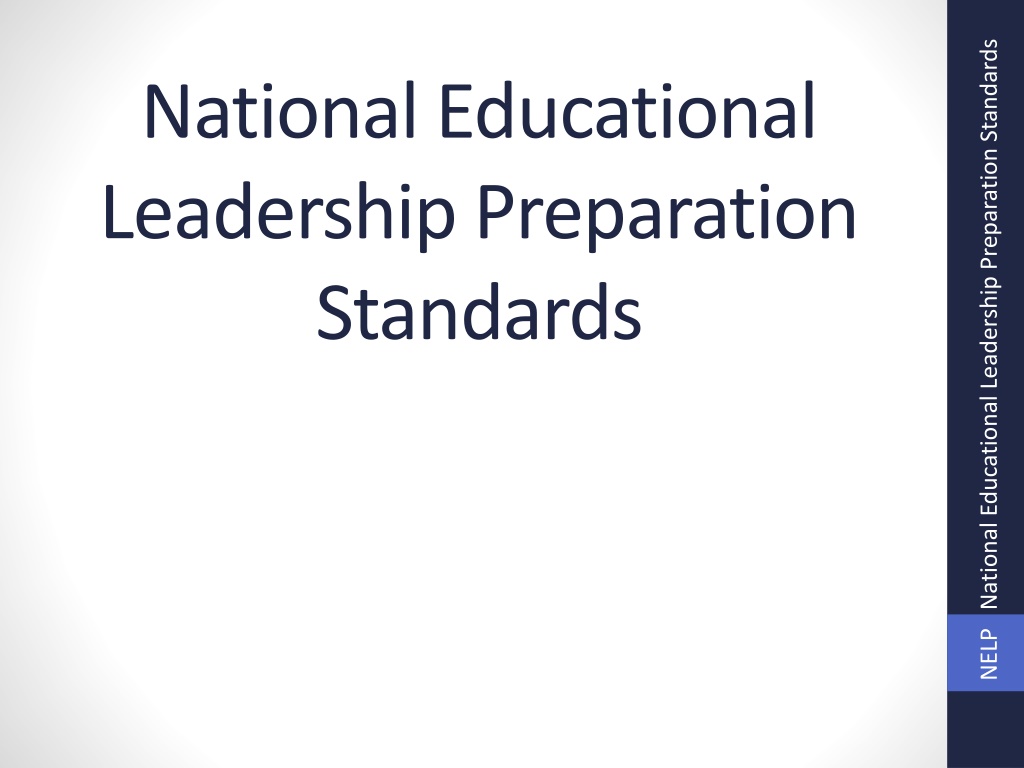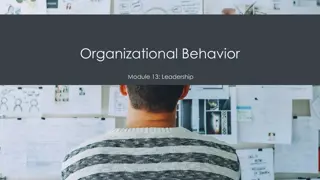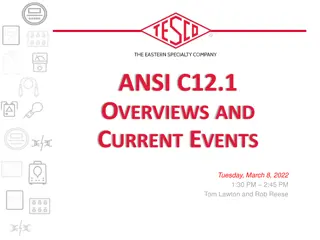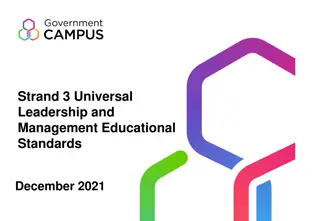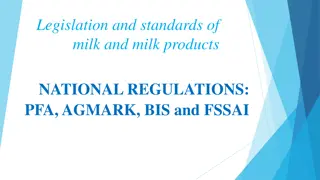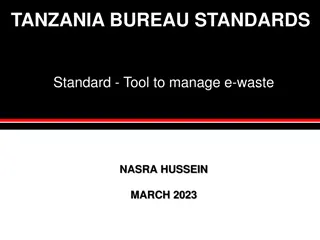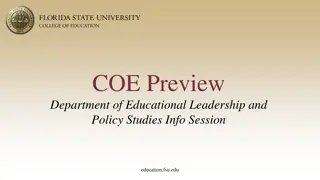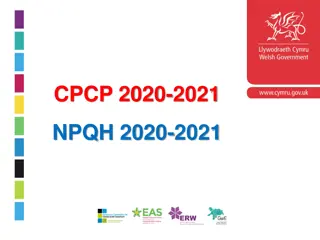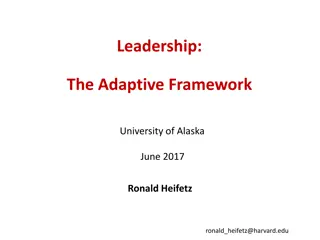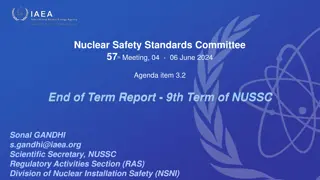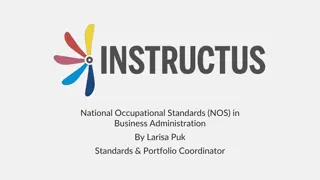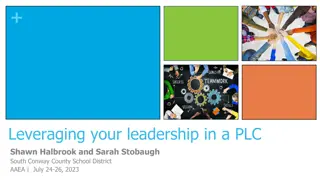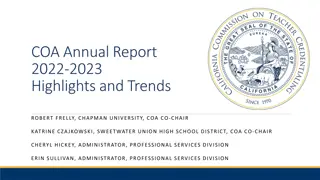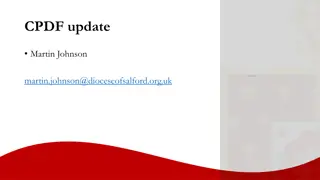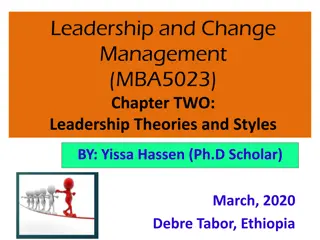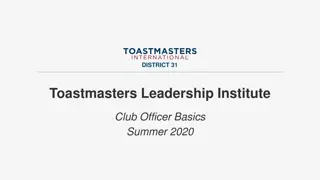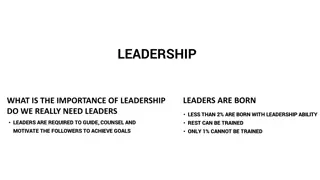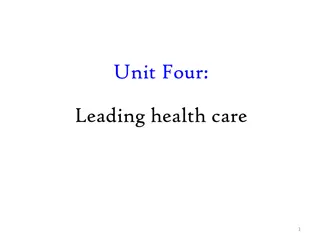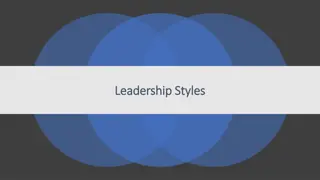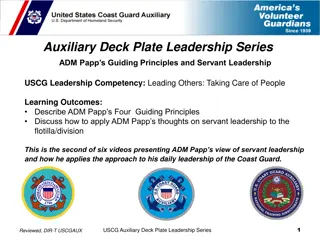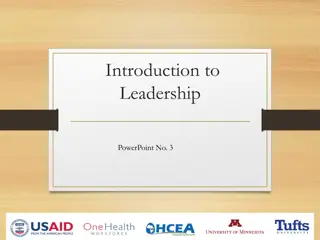National Educational Leadership Preparation Standards Overview
The National Educational Leadership Preparation Standards (NELP) provide a framework for developing school leaders. These standards focus on areas such as ethics, equity, curriculum, community support, and more. The standards are designed to enhance the professional capacity of educational leaders and promote meaningful engagement with families and communities. The NELP Standards are the result of collaboration among various education experts and aim to guide the preparation and development of effective school leaders in building and district roles.
Download Presentation

Please find below an Image/Link to download the presentation.
The content on the website is provided AS IS for your information and personal use only. It may not be sold, licensed, or shared on other websites without obtaining consent from the author. Download presentation by click this link. If you encounter any issues during the download, it is possible that the publisher has removed the file from their server.
E N D
Presentation Transcript
NELP National Educational Leadership Preparation Standards National Educational Leadership Preparation Standards
NELP National Educational Leadership Preparation Standards Two Sets of Standards Two Revisions Two Name Changes ISLLC & ELCC PSEL & NELP
NELP National Educational Leadership Prearation Standards Professional Standards for Educational Leaders (PSEL)
NELP National Educational Leadership Preparation Standards Professional Standards for Educational Leaders 2015 (PSEL) Standard 1 - Mission, Vision, and Core Values Standard 2 - Ethics and Professional Norms Standard 3 Equity and Cultural Responsiveness Standard 4 Curriculum, Instructions, and Assessment Standard 5 Community of Care Support of Students Standard 6 Professional Capacity of School Personnel Standard 7 Professional Community for Teachers and Staff Standard 8 Meaningful Engagement of Families and Community Standard 9 Operations and Management Standard 10 School Improvement
NELP National Educational Leadership Prearation Standards National Educational Leadership Preparation Standards (NELP)
NELP National Educational Leadership Preparation Standards NELP Charge: Develop the National Educational Leadership Preparation Standards (NELP) for Building and District Leaders
NELP National Educational Leadership Preparation Standards NELP Standards Committee Paul Katnik, State Education Agency, Missouri Susan Korach, University of Denver, Wallace Pipeline Glenn Pethel, AsstSup, Gwinnet County, Wallace Pipeline L. Oliver Robinson, AASA (superintendent) Pam Tucker, UVA (Evaluation Expertise) Michelle Young, Chair, UCEA, ELCC Joan Auchter, NASSP, ELCC Rosemarie Young, NAESP Tom Bellamy, UW- Bothell, Principal Supervisors Monica Byrne-Jimenez, Hofstra (ELL) David Chard, SMU Dean, Deans for Impact David DeMathews, (SPED), UT-ElPaso
NELP National Educational Leadership Preparation Standards Why do we need another set of standards for preparation? Why can t we just use the new PSEL standards?
Because of NELP National Educational Leadership Preparation Standards Where they focus, within the leadership career spectrum Which audiences they inform What positions they describe and to what level of specificity How they are used
NELP National Educational Leadership Preparation Standards NELP Requires Explicit Detail for Each Leadership Position PSEL Standards Speak Broadly to ALLPositions Performance Expectations & Indicators for: Performance Expectations & Indicators for: Other Positions Building Leadership District Leadership
NELP must focus on the Appropriate Level of Performance: Beginning NELP National Educational Leadership Preparation Standards Professional Standards (PSEL) Performance, Expectations & Indicators: Building Leadership Beginning = Preparation Standards (NELP) Emerging Developing Distinguished
NELP National Educational Leadership Preparation Standards How are preparation standards currently used? Program Approval/ Accreditation Program Design & Alignment Program Expectations
NELP National Educational Leadership Preparation Standards CAEP (National Accreditation) Requirements for SPA Standards 1. 2. 3. Must align to CAEP Principles May have only 7 standards and 28 elements Must be written so that each concept in an element appears in the language of the standard Must include supporting explanations, research support, and describe appropriate performance assessments Must include rubrics or criteria to guide reviews (must be measurable) An 8th standard on the clinical experience can be requested 4. 5. 6.
NELP National Educational Leadership Preparation Standards Transforming the 10 Practice Standards into 7 Preparation Standards for Building and District Leadership Preparation Identifying the Appropriate Focus and Developmental Level for beginning Building and District Leaders Design Challenges Providing guidance to CAEP concerning 2014 requirements for Advanced Preparation Programs in Educational Leadership Identifying the most appropriate ways to assess candidate learning and measure program impact.
NELP National Educational Leadership Prearation Standards Draft NELP Standards Building Leader Standards Mission, Vision and Core Values Ethics and Professional Norms Equity and Cultural Leadership Learning & Instruction Community and External Leadership Operations and Management Building Professional Capacity (The Internship) District Leader Standards Mission, Vision and Core Values Ethics and Professionalism Equity and Cultural Leadership Instructional Leadership Community and External Leadership Management and Operations Policy, Governance, and Governance (The Internship) 1. 1. 2. 2. 3. 3. 4. 5. 4. 5. 6. 6. 7. 7. 8. 8.
Standard One: Mission, Vision, and Core Values Component 1.1 (MISSION AND VISION) Program completers understand and demonstrate the capacity to lead, advocate for, and implement a collaboratively developed and data-informed mission, vision and strategic plan that supports continuous school improvement. Component 1.2 (VALUES) Program completers understand and demonstrate the capacity to articulate, advocate, model, and cultivate a set of core values, which emphasize equity, democracy, diversity, inclusiveness, community, commitment, and trust, that provide a foundation for a positive school culture, mission and vision. Component 1.3 (COHERENT SYSTEM) Program completers understand and demonstrate the capacity to collaborate with staff, families and other members of the school community in designing, implementing, evaluating, and refining coherent and complementary systems of academic and social supports and services to achieve the mission, vision and core values of the school. Component 1.4 (IMPROVEMENT) Program completers understand change processes and demonstrate the capacity to engage staff and school community to develop, implement and evaluate a continuous, responsive, sustainable, data-informed school improvement process to achieve the mission, vision and core values of the school.
Standard Two: Ethics and Professional Norms Component 2.1 (PROFESSIONAL NORMS) Program completers understand and demonstrate the capacity to enact the professional norms of integrity, fairness, transparency, trust, collaboration, perseverance, self-awareness, reflection, life-long learning and continuous improvement in their actions, decision making, management of resources and relationships with others. Component 2.2 (ETHICAL BEHAVIOR) Program completers understand professional ethics and demonstrate the capacity to model ethical behavior in their personal conduct, relationships with others, decision-making, responses to unethical or unprofessional actions, and stewardship of the school s resources. Component 2.3 (PROFESSIONAL JUDGEMENT) Program completers understand and demonstrate the capacity to consider ethical dilemmas, moral and legal consequences, and potential conflicts between individual and group rights in their decision making processes.
Standard Three: Equity & Cultural Leadership Component 3.1 (SUPPORTIVE SCHOOL COMMUNITY) Program completers understand and demonstrate the capacity to shape and maintain a safe, caring, healthy, inclusive and responsive school environment that embraces the belief that all students can learn at high levels, fosters supportive relationships, and monitors and addresses individual and institutional biases to ensure each student and adult is treated fairly, respectfully, in a responsive manner. Component 3.2 (EQUITABLE PROCEDURES) Program completers understand and demonstrate the capacity to develop, implement, and evaluate equitable guidelines, procedures and decisions that ensure each student and adult is treated fairly, respectfully, and with an understanding of culture and context. Component 3.3 (EQUITABLE ACCESS) Program completers understand and demonstrate the capacity to ensure that each student has equitable access to effective teachers, positive relationships with peers and adults, learning opportunities, social and behavioral support, accommodations and interventions, a quality library and learning materials, technology, and other resources necessary for success. Component 3.4 (RESPONSIVE PRACTICE) Program completers understand and demonstrate the capacity to support the development of responsive and equitable practices among teachers and staff, including the ability to recognize, respect and employ each student s strengths, diversity and culture as assets for teaching and learning and torecognize and redress biases, marginalization, deficit-based schooling, and low expectations associated with race, class, culture and language, gender and sexual orientation, religion, and disability or special status.
Standard Four: Learning and Instruction Component 4.1 (LEARNING SYSTEM) Program completers understand and demonstrate the capacity to develop, align, and implement coherent systems of curriculum, instruction, and assessment that are responsive to student needs, embody high expectations for student learning, align with academic standards, and promote academic success, career readiness, innovation and social emotional well-being for each student. Component 4.2 (INSTRUCTIONAL PRACTICE) Program completers understand and demonstrate the capacity to promote challenging, engaging and equitable instructional practice consistent learning theory and research on special populations, child development, learning, and effective teaching. Component 4.3 (CURRICULUM SUPPORTS) Program completers understand and demonstrate the capacity to develop and implement curricular resource and support systems that effectively and efficiently utilize time, technologies, instructional spaces, data, staffing, professional development, and communication to support equitable access to learning for each student, including linguistically diverse students and those with special needs. Component 4.4 (ASSESSMENT SYSTEM) Program completers understand and demonstrate the capacity to lead a technically, developmentally and culturally appropriate system of formative and summative assessment and data collection, management, analysis, and use to monitor and provide feedback on student progress and for instructional improvement.
Standard Five: Community and External Leadership Component 5.1 (ENGAGEMENT) Program completers understand and demonstrate the capacity to engage families, community members, and school personnel in strengthening student learning in and out of school. Component 5.2 (COMMUNICATION) Program completers understand and demonstrate the capacity to participate in regular and effective two-way communication with families, community members, feeder and connecting schools, and the district central office. Component 5.3 (PARTNERSHIPS) Program completers understand and demonstrate the capacity to build and sustain partnerships that value and access the cultural, social, intellectual and political resources of diverse families, communities and public and private sectors for the benefit of school improvement and student development. Component 5.4 (ADVOCACY) Program completers understand the implications of larger political, social, economic, legal, and cultural changes and expectations and demonstrate the capacity to advocate for the needs and priorities of the school, district, students, families, the community and the profession.
Standard Six: Operations and Management Component 6.1 (MANAGEMENT AND OPERATION SYSTEMS) Program completers understand and demonstrate the capacity to develop, monitor, and evaluate school management, governance, and operation systems that support each student s learning needs and promote the mission and vision of the school. Component 6.2 (DATA AND RESOURCES) Program completers understand and demonstrate the capacity to seek, acquire, and manage fiscal resources, physical resources, technological resources, data, and other resources to support student learning, collective professional capacity and community, and family engagement. Component 6.3 (COMMUNICATION SYSTEMS) Program completers understand and demonstrate the capacity to develop and coordinate communication systems that gather and deliver actionable information for student learning, school improvement, and community engagement and enhance understanding. Component 6.4 (LEGAL COMPLIANCE) Program completers understand and demonstrate the capacity to interpret, apply and adhere to applicable laws, rights, policies, and regulations to promote student and adult safety and success.
Standard Seven: Building Professional Capacity Component 7.1 (PROFESSIONAL CAPACITY MANAGEMENT) Program completers understand and have the capacity to lead a professional capacity management system that recruits, hires, and supports, professionally develops, and retains effective, caring and diverse educational personnel and creates leadership pathways for effective succession. Component 7.2 (PROFESSIONAL CULTURE) Program completers understand and have the capacity to develop and sustain a positive professional culture of inquiry, collaboration, innovation and shared-leadership that empowers school staff with collective responsibility for enacting professional norms as they collaboratively work to achieve the school s shared vision, continuous school improvement and objectives pertaining to the education of the whole child. Component 7.3 (SYSTEMS AND CONDITIONS) Program completers understand and have the capacity to develop workplace conditions that promote employee leadership, well-being, and professional learning and growth. Component 7.4 (SUPERVISION AND EVALUATION) Program completers understand and have the capacity to implement research-anchored systems of supervision, support and evaluation that provide actionable feedback about instruction and other professional practices, promoting professional learning, leadership, and commitment to continuous school improvement.
Public Comment - Sources NELP National Educational Leadership Preparation Standards We received public comment on the draft NELP Standards for Building Level and District Level Leaders from the following sources: Committee members SurveyMonkey public comment surveys Unsolicited feedback from individuals Focus groups
NELP National Educational Leadership Preparation Standards NELP Survey Results 85.5% of the respondents rated the NELP Building Level standards as excellent(43.5%) or good (42%) 85% said the standards represented a clear and coherent vision for preparing school leaders.
NELP Results by Standard NELP National Educational Leadership Preparation Standards Standard Appropriate Emphasis? Wording Clear? Warrant a domain? 1 92% 88% 98% 2 88% 89% 100% 3 78% 84% 97% 4 77% 92% 97% 5 80% 92% 100% 6 82% 92% 100% 7 83% 95% 94% 8 81% 89% 94%
Next Steps Finalization of Standards (May, 2017) Finalization of Research Anchoring (June, 2017) Finalization of Preamble, Rubrics, Glossary, etc.. (June, 2017) Submit to NPBEA (July, 2017) Submit to CAEP (August, 2017) Available for Use (January, 2018)
NELP National Educational Leadership Prearation Standards CONTACT INFORMATION: Michelle Young NELP Committee Chair 434.243.1041 mdyucea@virginia.edu
